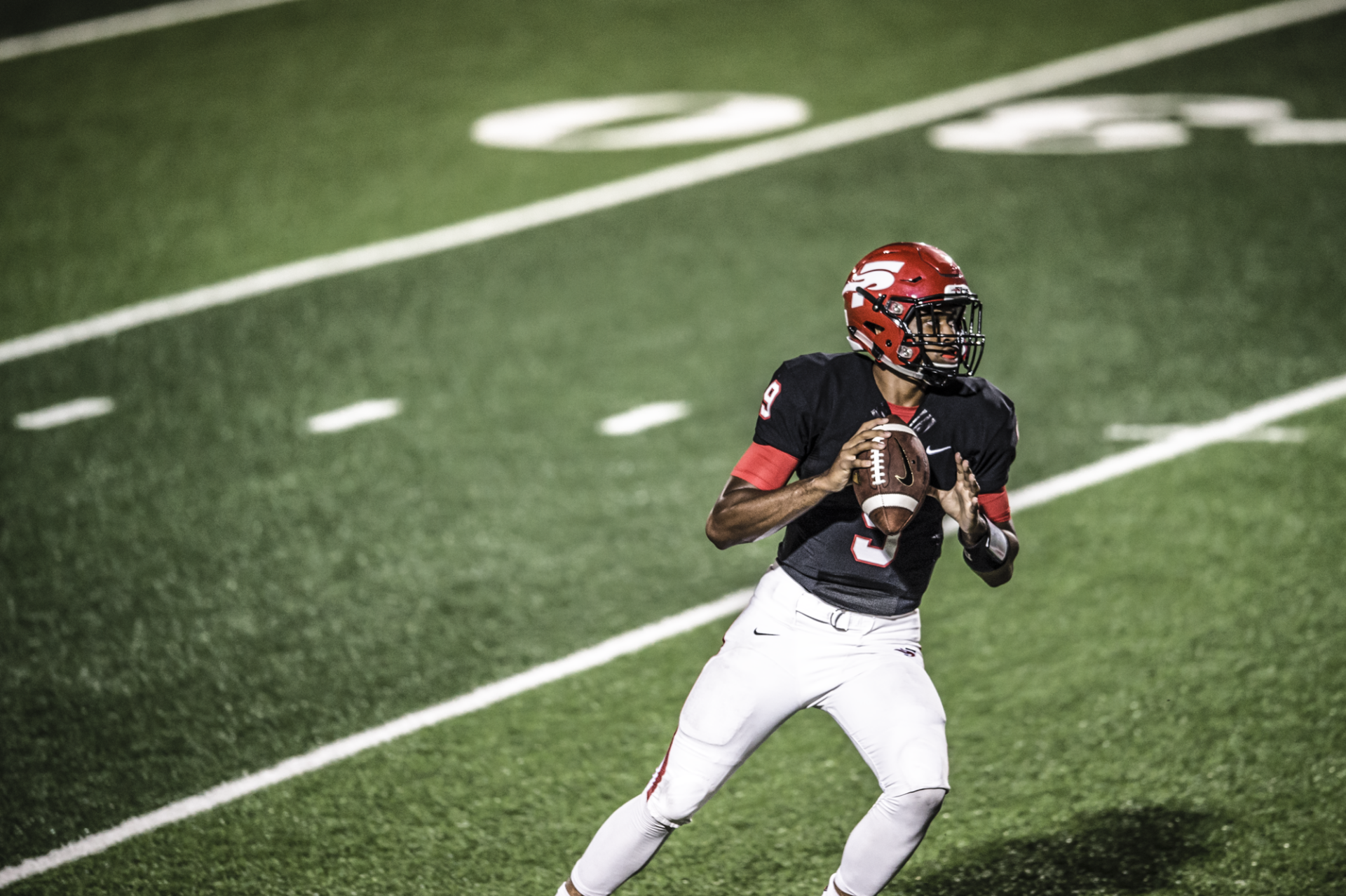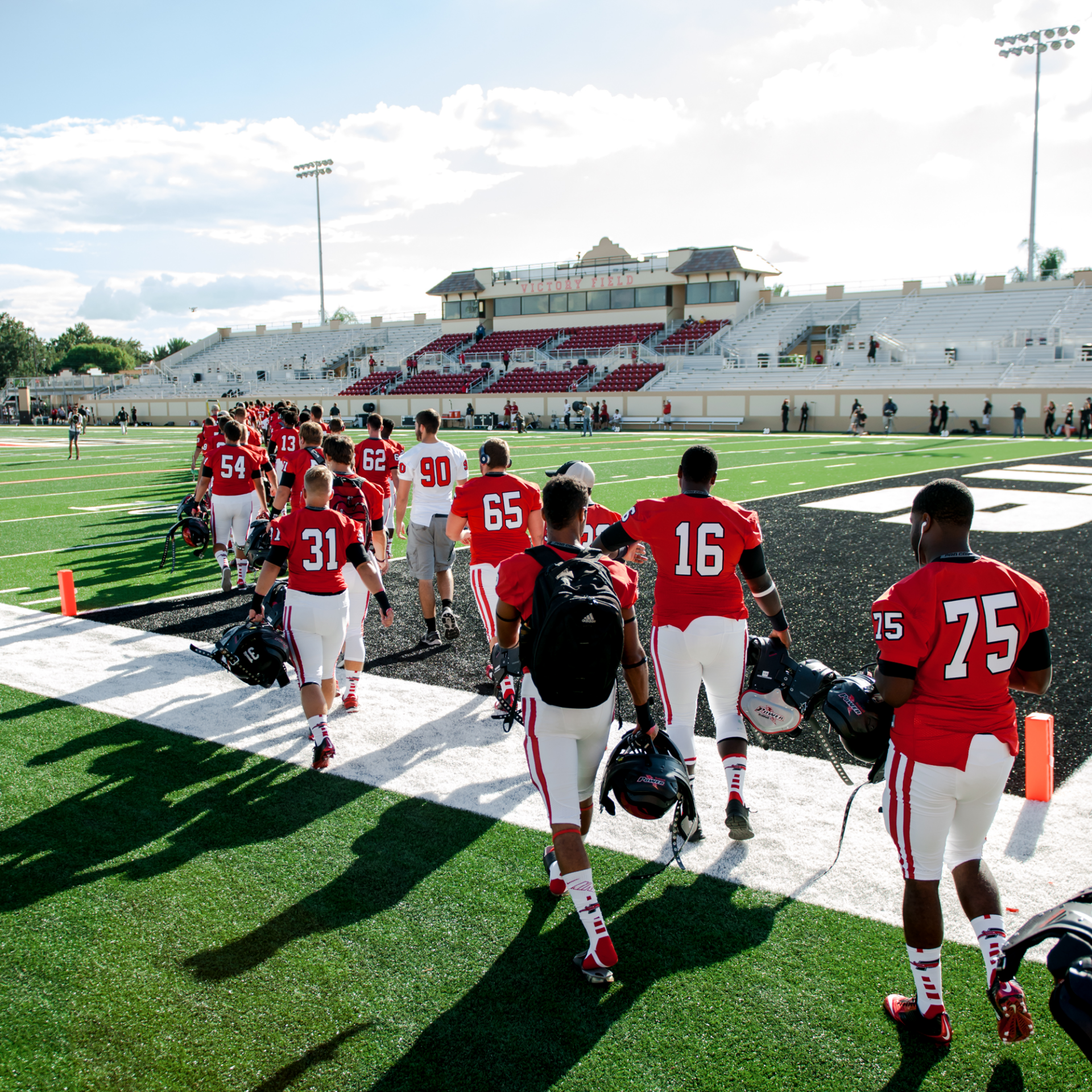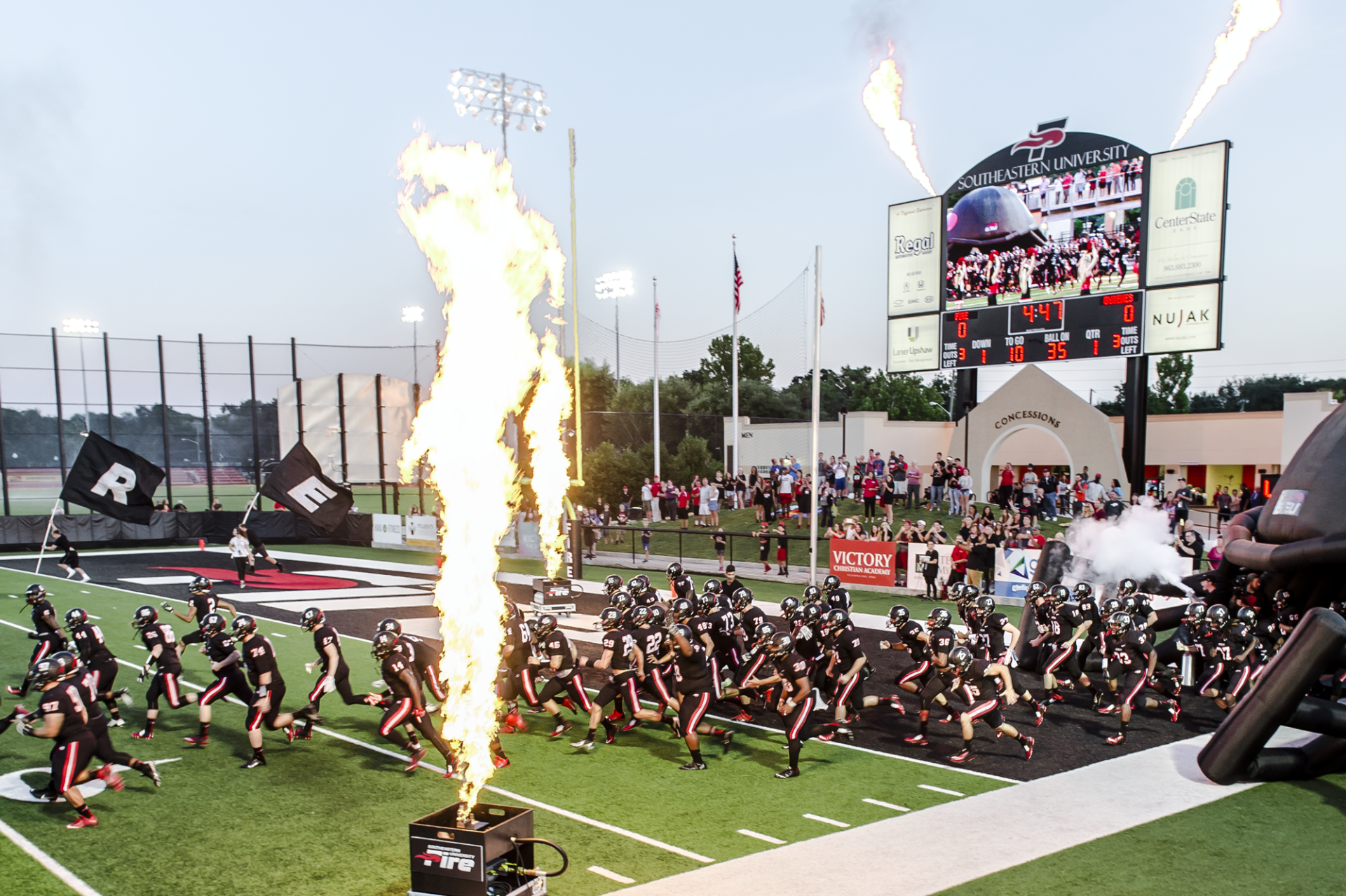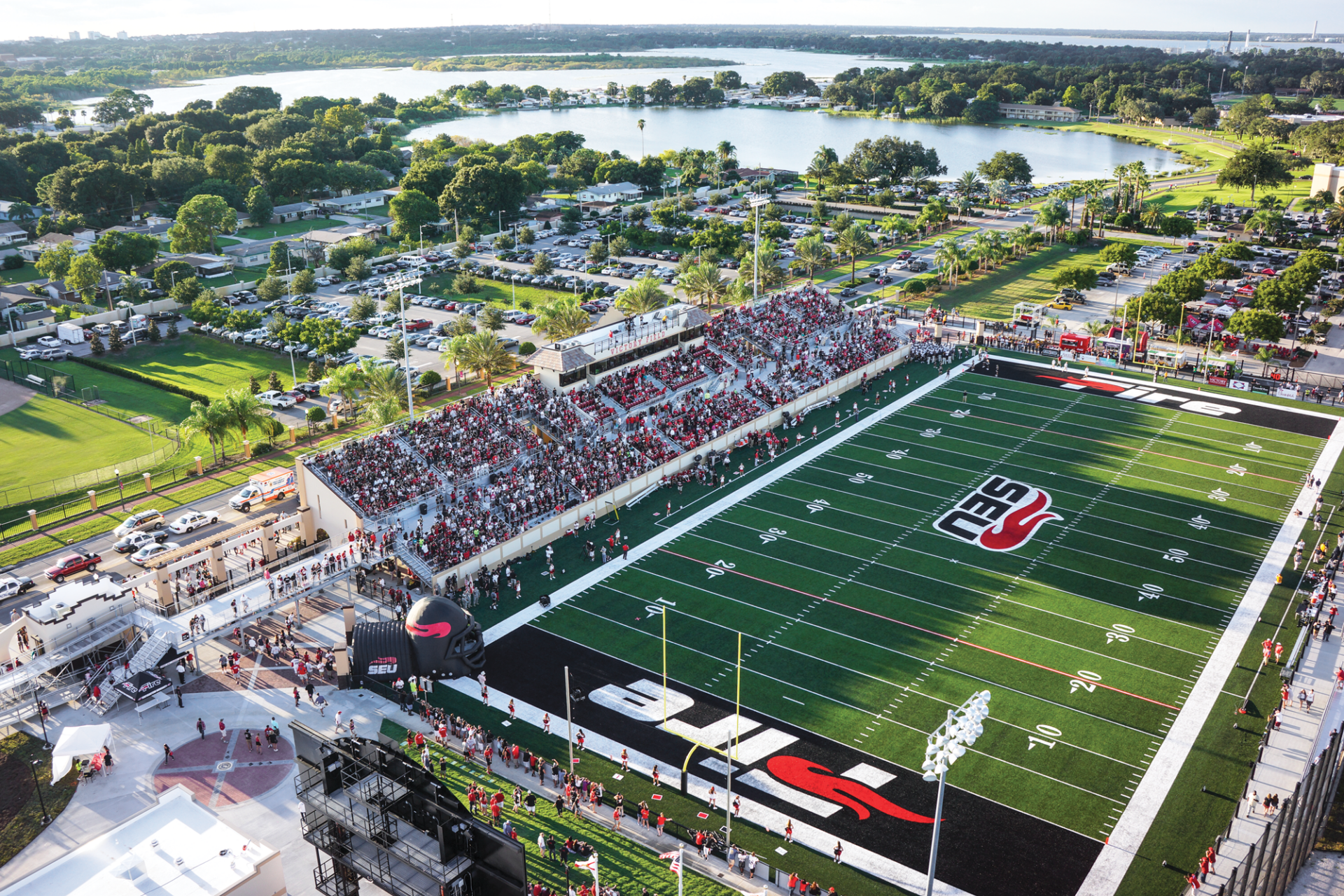Home game was a guaranteed victory. At least that’s what President Dr. Kent Ingle promised the campus at Southeastern University’s grand opening of Victory Field and premiere of SEU’s first football team. While it didn’t happen overnight, the addition of the team has not only rapidly increased enrollment and diversified a private campus, but perhaps it also set a school’s spirit on FIRE.
Photography by Loree Rowland, Southeastern University
Collin Thomas called Southeastern University football coach Keith Barefield seven times. Seven times, it went to voicemail.
Thomas, then a high school senior from Dillsburg, Pennsylvania, made the 999-mile trek with his parents, arriving in Lakeland on a Saturday. It was the middle of January, perfectly timed to escape the drudgery of a long Pennsylvania winter. Upon arriving in Lakeland, an excited Thomas and his family checked into a Residence Inn and began dialing Barefield. The number of phone attempts climbed, yet Thomas wasn’t deterred. The family made the most of their trip — eating Mexican food and catching a movie. They basked in 79-degree weather. Thomas was already in love with Lakeland.
The morning of Thomas’ last day in Lakeland, on his eighth phone call, he finally reached Barefield. “Yeah, I wasn’t heavily recruited at all,” says Thomas. “I didn’t get a scholarship, and I wasn’t asking for one. I just wanted to play.”

“The only thing (Thomas) asked for was for an opportunity to play and show what he could do,” says Barefield. “He wanted a shot to be a college quarterback. Since we had no players at that point, and therefore, no one at any position for that matter, the greatest commodity we had was opportunity.”
When they finally connected, Barefield invited Thomas to lunch on campus. “We met for about three hours and talked mainly about the vision of SEU football,” Thomas says. “We didn’t talk too much about me as a football player. Coach Barefield said he’d watched my highlight film. ‘You can play a little bit’ was basically the extent of that conversation.’ I left my visit without having any idea if I was officially being recruited or not.”
More than a month later, back in Pennsylvania, Thomas received his answer. A package had arrived in the mail — a National Letter of Intent from SEU.
Thomas arrived on campus the next fall, without a scholarship, a part of football’s inaugural recruiting class. He was one of a 114 brand-new recruits. “To say the least, it was intimidating,” Thomas says. “A hundred and fourteen guys with no weight room, no strength coach, no field. But Coach Barefield promoted so well; everyone had a long-term mindset.”
Barefield himself curated this long-term mindset. “My very first conversation with Southeastern was over at Mimi’s Café in Lakeside Village, way back in June of 2012,” Barefield jokes. “I visited with the administration over breakfast. Dr. Ingle, Chris Owen — we talked about the possibility of launching football here. It was not so much an interview for the job; I was there to talk about the things involved to start a new program. They showed me the campus, what their plans were, what their vision was for the program.”

It wasn’t until November, the week before Thanksgiving when Barefield was invited for an official interview. SEU offered him the position. He accepted.
“December 1, 2012, was my first day, and there was nothing. Absolutely nothing,” Barefield says. At the press conference announcing his hire on December 4, Barefield had a hard time finding a football. “We had to scour the intramural offices to find one.”
Barefield’s first office was a cubby hole on the third floor of a men’s dorm, which he shared with four other coaches. His cubby came with one noticeable benefit — a scenic view, looking out over a picturesque grass field, the proposed future home of his football stadium.
Barefield didn’t hire his first assistant until January 8. During that first lonely month, Barefield quickly began recruiting. December was prime time for high school playoffs and state championships. “I watched a lot of football games. (Southeastern) got me an email box, and I almost wished they hadn’t. I’d stay up until two or three o’clock in the morning, trying to go through emails, all the athletes who’d heard we started football and wanted to be a part of the program.” One such athlete was Collin Thomas.
“I emailed Coach the day he was hired. I wanted to be one of the first ones to introduce myself.” Thomas laughs, “I didn’t hear anything back for weeks.”
“I am flesh and blood,” jokes Barefield. “I need to sleep an hour or two a night.”
In the spring of 2013, players began arriving on campus. Richie Marsh, the first assistant hired at SEU, wore multiple hats — defensive coordinator and recruiting coordinator chief among them. Barefield and Marsh recruited around the clock. “The number of recruits we had contact with that first year, it was thousands and thousands of kids,” says Barefield. “And we thought they would love our campus when they came [to visit], but when we got to the football facilities, we didn’t want them to think we were snake oil salesmen. We’d tell them what would be here, but there was nothing that resembled a football program.”
Barefield must have cast an impressive vision, going from zero to a 114 student-athletes in a matter of months. By August of 2013, an entire roster of athletes bought into Barefield’s sales pitch, yet still didn’t have a place to play. That first season, if it can be called that, the team split practice time between Crystal Lake Middle School and Bonny Park. With nary a game on the schedule, a field to play on, nor a full staff of coaches, 114 guys bonded over sprints and tackling sleds. The guys became known as the Bonny Park Boys — a moniker that lives on today.
The Bonny Park Boys survived a season of practicing for the sake of practice, believing in Barefield’s vision. “I wouldn’t trade that year for anything,” Thomas says. “Yes, it was hard. It wasn’t fun. But I take a lot of pride in the fact we were committed, and we were committed together.” Thomas, over the course of that first year, learned his shot at playing football at SEU would not come as quarterback.

“Coach Marsh saw something in Collin that caused him to request he move over to defense and play strong safety,” Barefield says. “That was a bold request, as Collin was not the most physical or aggressive player at that point. I had my doubts. But Collin committed to being the best strong safety he could be. He went to work and made himself into our starting strong safety for the first year of the program.”
In September of 2014, less than two years after Barefield’s press-conference scavenger hunt for a football, SEU arrived in Montgomery, Alabama, for their inaugural contest against Faulkner University. SEU’s grand opening wasn’t particularly grand — SEU found themselves down 24-3 by halftime. By the third quarter, they were down 38-3. The Bonny Park Boys were overwhelmed by a nationally ranked, experienced team. There was work to be done.
A week later, Southeastern prepared for another grand opening — the opening of Victory Field, a new $7-million, 3,500-seat stadium built on the picturesque field beneath Barefield’s office. “I remember the ribbon cutting was on Friday,” Barefield says. “So they cut the ribbon, and our President, Dr. Ingle, he stands up, he guarantees a victory. For some reason, he never thought to consult me about that.” It was a bold prediction given the pounding the team received just one week prior. “I had his back. We had to win. I was not going to live with the president of my university guaranteeing something I couldn’t deliver.” In front of a sold-out crowd, multisport athlete Will May put the stadium’s first points on the board with a 27-yard field goal kick less than four minutes into the game. Twenty-eight points later, on 450 yards of total offense, the Southeastern Fire delivered on Ingle’s guarantee, a 31-7 trouncing of Warner University.
As far as first seasons go, the Bonny Park Boys had some impressive success, finishing the season at 7-3. Individually, Thomas had a remarkable first year, recording 43 tackles, 3.5 for a loss. He took home academic all-conference honors. Not bad for a converted QB.
In Thomas’ redshirt sophomore season, the level of competition went up, especially against his own team. The quality of recruits Barefield signed for 2015 was improving, which may or may not have had something to do with the brand-new facilities and full coaching staff. Nevertheless, Thomas made his tackles that season, started every game, and earned scholarship money along the way. The team finished with a 10-1 mark, exceeding 60 points on three occasions. Also having success, especially in terms of enrollment, was the school itself. Long considered a small Bible college, the university was shedding that image and appealing to a much broader array of students. Enrollment from 2014 to 2015 was up over 18 percent in a single year. Having a burgeoning football program certainly didn’t hurt the school’s appeal, either.

Thomas’ junior season came with a couple more losses than the year before. But it also marked the first postseason berth for the school. Ranked 20th in the country, the Fire lost to undefeated NAIA powerhouse Reinhardt University in the first round of the playoffs. While the loss stung, reaching the postseason became the school’s new barometer of success.
Steadily, through injuries and transferring and attrition, the number of Thomas’ fellow Bonny Park Boys had been on the decline. With Thomas approaching his fifth-year senior season, only 10 others from the original 114 remained. Eleven guys who quite literally started with nothing, sold on a promise of opportunity, were now part of a nationally ranked team with postseason experience.
Thus began the final season of the Bonny Park Boys, a final stamp on their SEU legacy. Whispers of national championship permeated the locker room, a goal no longer deemed unreasonable. Behind an ultra-high-octane offense, scoring an outlandish 55 points a game, the school played their best football to date, reaching number nine in the rankings, earning a spot in the postseason for a second straight year. The team missed hosting a playoff game by a single ranking spot, drawing undefeated Lindsey Wilson College out of Kentucky in the first found. Consequently, Lindsey Wilson had delivered the Fire their lone loss during the regular season, a 43-30 defeat. The Bonny Park Boys would need to exact revenge to extend their careers.
On November 18, 2017, The Fire put up 49 points on 613 yards of offense and a dizzying 36 first downs.
It wasn’t enough.
The Bonny Park Boys had played their last game. The scoreboard read 63-49 in favor of their opponents, the words national and championship to be merged by an SEU team somewhere in the (hopefully near) future. What that team will not have, what any team will never have, however, is the distinction of being the first. “These guys set the bar,” Barefield says. “They are the origin of this program.”
“I just wanted an opportunity to play football at SEU,” says Thomas, who finished his career as a three-time NAIA scholar-athlete. “Now, I want to be a coach.”
“Collin possesses the intellect, the commitment, and the work ethic to be good at anything. He has the ingredients of an outstanding coach. The one quality that will set him apart from other coaches is his passion for the game. Passion is what separates the winners from the losers,” says Barefield.
Speaking of winners, The Chronicle for Higher Education has recognized SEU as one of the fastest-growing private nonprofit baccalaureate institutions in the nation. Since the launch of the football program, enrollment has crept over 7,000, an increase of nearly 87 percent in just four years. When asked about the historic rise in enrollment, the school offered this: “We attribute the rapid growth to new curricular programs as well as learning platforms we have introduced that make education both affordable and accessible.”
Does football drive enrollment, at least at some level? Maybe. Maybe, though, that’s a question for one of the Bonny Park Boys.
Eleven guys who quite literally started with nothing, sold on a promise of opportunity, were now part of a nationally ranked team with postseason experience.
